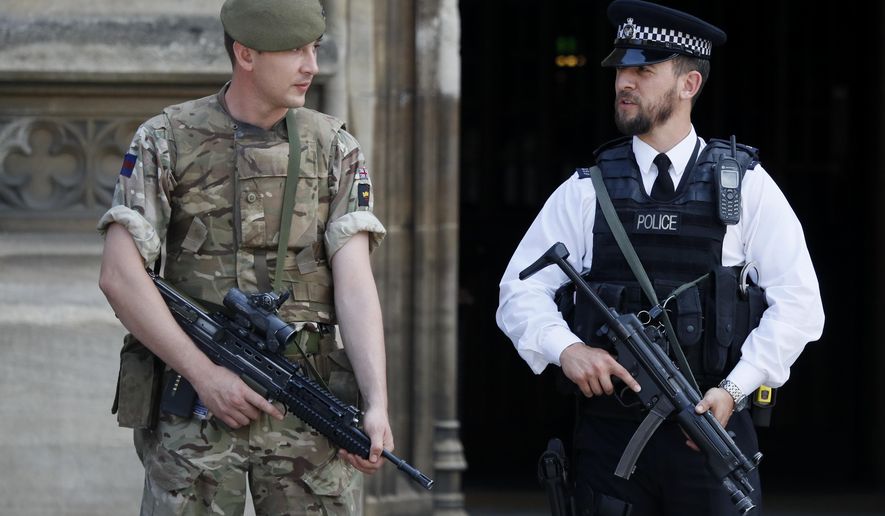The diplomatic flap over American officials divulging details of a British terrorism investigation lit a fire Thursday under U.S. investigators of intelligence agency leaks, an issue that had been on a back burner when the primary victim of leaks was President Trump.
After British officials chided the U.S. for disclosing to The New York Times sensitive details of the deadly terrorist bombing in Manchester, Mr. Trump ordered a Justice Department investigation and lawmakers on both sides of the aisle in Congress demanded action.
The U.K., one of America’s closest allies and intelligence partners, stopped sharing information with the U.S. about the investigation of the Islamic State-linked bombing, which killed 22 and injured dozens more at an Ariana Grande concert Monday.
Mr. Trump called the leaks “deeply troubling.”
“These leaks have been going on for a long time and my administration will get to the bottom of this,” he said in a statement while attending a NATO summit in Brussels. “The leaks of sensitive information pose a grave threat to our national security.”
Attorney General Jeff Sessions immediately launched an investigation. “These leaks cannot be tolerated, and we will make every effort to put an end to it,” he said.
However, an investigation should have been initiated the first time classified information was disclosed, including internal inquiries within the National Security Agency and the CIA.
Rep. Adam B. Schiff of California, the top Democrat on the House Permanent Select Committee on Intelligence, joined the outrage.
“We must take any steps necessary to remedy this problem immediately,” said Mr. Schiff, who has spearheaded the committee’s investigation into any Trump campaign links to Russian spies. Intelligence leaks have propelled the probe forward.
“The British government has every right to be furious,” said Mr. Schiff, who rarely balked at leaks targeting Mr. Trump.
“The United Kingdom is one of our best intelligence partners, and the intel-sharing relationship is critical to our security and theirs. Any break or deviation from that relationship or the profound trust we have in the British and they have in us would be a grave loss for both countries,” Mr. Schiff said.
The committee announced in mid-March that it was investigating leaks and pressing the FBI, CIA and NSA to cooperate. That effort has remained under the radar in Washington, and committee aides refused Thursday to say whether any progress had been made.
The leaks from the intelligence community to the news media have plagued the Trump administration, but until this week the revelations were aimed almost exclusively at damaging the president. Concerns previously took a back seat to probes into suspected Trump campaign collusion with Russian spies to impact the election.
The leaks have become routine, including information gleaned from phone calls intercepted by spy agencies and accounts of Oval Office conversations given to the CIA.
Until now, the loose lips in the intelligence community were attributed to Obama administration holdovers and other “deep state” opponents of Mr. Trump.
Rep. Michael T. McCaul, Texas Republican and chairman of the House Homeland Security Committee, said leaks should be targeted by former FBI Director Robert Mueller. The Justice Department special counsel is investigating Russian interference in the November presidential election.
“You question the motivation. Why are they leaking this very sensitive information?” Mr. McCaul said on the Fox Business Channel show “Cavuto Coast to Coast.”
“We know the unmasking also was a huge issue [and] possibly used politically throughout the intelligence community,” he said. “These are big no-nos within the IC. This was not supposed to happen, particularly so close to the president.”
It was learned last month that Susan E. Rice, President Barack Obama’s national security adviser, unmasked the identities of Trump campaign officials caught up in spy agency surveillance.
With their identities revealed, the information spread through the intelligence community and Mr. Trump’s associates were rendered vulnerable to leaks. At least some information was leaked during the presidential campaign, in which Mr. Obama rallied against Mr. Trump.
The information disclosed about the Manchester investigation included the name of the suicide bomber, which threatened to undermine pursuit of his accomplices and had the potential to speed up the timetable for any further attacks.
The newspaper also published forensic photographs from the scene of the attack.
Former CIA Director Michael V. Hayden said the British were justified in cutting America out of the Manchester investigation.
“There should be no sense of anger on our part, rather a sense of disappointment and shame in our own performance,” Mr. Hayden, who also ran the NSA, told the Washington Times.
“This is British information that is shared on the condition that we will follow British rules. They have an absolute right to do what they did. It should be a lesson for us,” he said.
• S.A. Miller can be reached at smiller@washingtontimes.com.




Please read our comment policy before commenting.